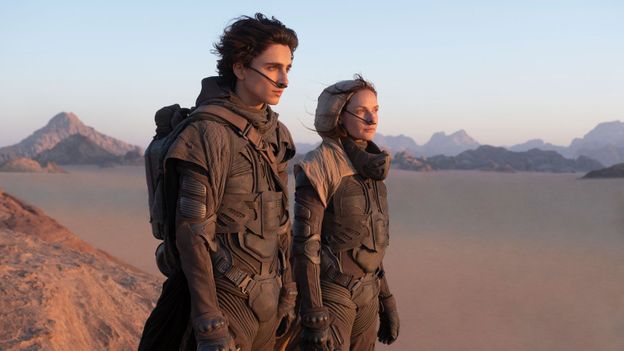Four stars for Dune


The design is wonderfully dark and imposing, but there are reflections of Star Wars everywhere: in the massed ranks of fascistic troops; in the monumental vehicles with caterpillar tracks; in the cockpits and pilots’ uniforms, which seem to date back to the 20th Century (the film is set in the year 10,191). There’s even a “Luke, trust your feelings” moment when Paul is piloting the Arrakis equivalent of an X-Wing Fighter (a Dragonfly-wing Fighter, essentially). But Villeneuve and his team separate their film from Lucas’s in two ways. One is by accentuating the story’s geopolitical resonances. Arrakis is home to “the spice”, a hallucinogenic drug that is somehow essential to interstellar travel. That’s why forces from different planets keep turning up to exploit it and fight over it, and generally make life difficult for the desert-dwelling Fremen (played by Javier Bardem, Zendaya and others) whose clothes and language are familiar enough to remind us that this alien world is not so alien, after all.
Disappointingly, once Villeneuve has pointed out that timely parallel, he doesn’t do much with it – he has too many other elements to fit in – so the more obvious way that Dune is distinct from Star Wars is in how sombre it is. This is a self-consciously grandiose epic, with a doom-and-gloomy mood, a dusty, brown-and-grey colour scheme, and a Hans Zimmer score that stacks up layers of deafening squeals, drones and pounding thumps. There are no zany robots or cuddly aliens, and I counted a total of two jokes. Not everyone will be able to take its complicated mythology seriously, but Villeneuve does. That comes as a relief. Most of today’s blockbuster entertainment is artificially sweetened by spoonfuls of irreverent one-liners, so it was courageous of the film’s producers to make a colossal science-fiction blockbuster that has no snark or sarcasm, and no characters who do anything stupid.
Still, a little light and shade would have been welcome. Dune goes on for two-and-a-half hours, and although Villeneuve and his co-writers, Eric Roth and Jon Spaihts, do a skilful job of establishing their byzantine fictional universe without relying on long speeches, captions or voiceovers, the lack of vaguely natural conversation and exciting action means that the minutes don’t exactly fly by. Towards the end, especially, the pace drags, partly because the film doesn’t accelerate towards a conclusion. Rather than telling a whole story, the narrative stops halfway through the novel: on the screen, it has the title of “Dune: Part One”.
Maybe we should be grateful that Villeneuve didn’t choose to make a television series, as that’s the fashionable way to adapt novels at the moment, but I wonder if he should have gone the full Lord of the Rings and opted for three parts instead of two. As it is, a film with this scope and richness is a splendid achievement, but it’s easier to admire than to love. There is some humanity in there somewhere: at heart it’s a coming-of-age story about a boy becoming tougher and more cynical on his way to becoming a leader. But will anyone care about the shallow, po-faced characters? They’ve got exotic names and elaborate costumes, but none of them has much warmth or personality compared to those in a certain other space opera which I won’t mention.
★★★★☆
Love film and TV? Join BBC Culture Film and TV Club on Facebook, a community for cinephiles all over the world.
If you would like to comment on this story or anything else you have seen on BBC Culture, head over to our Facebook page or message us on Twitter.
And if you liked this story, sign up for the weekly bbc.com features newsletter, called The Essential List. A handpicked selection of stories from BBC Future, Culture, Worklife and Travel, delivered to your inbox every Friday.








